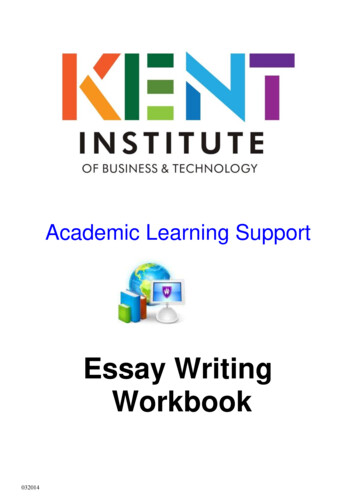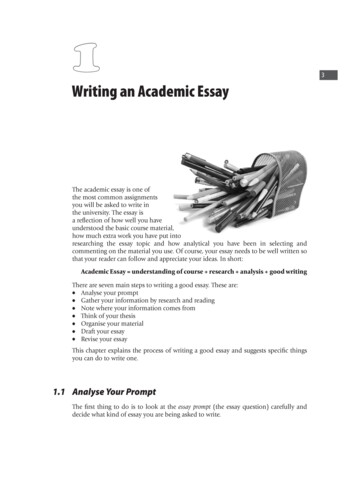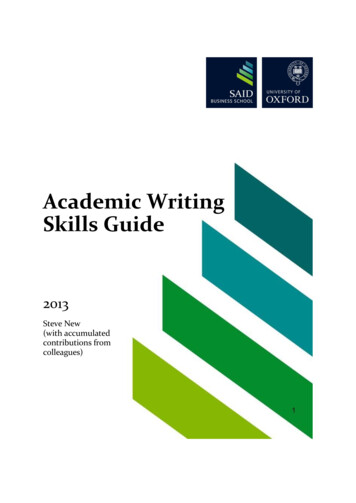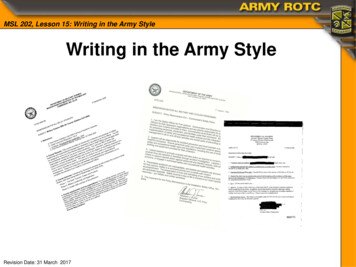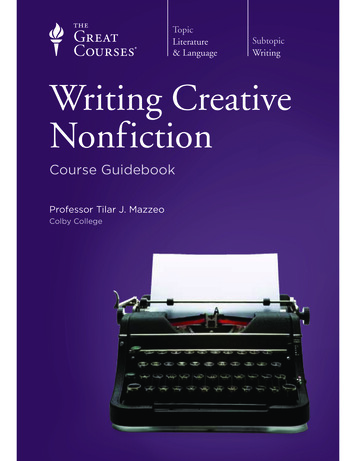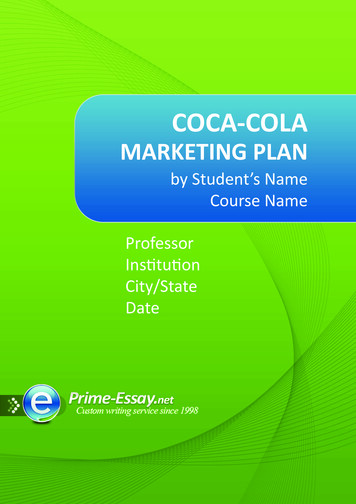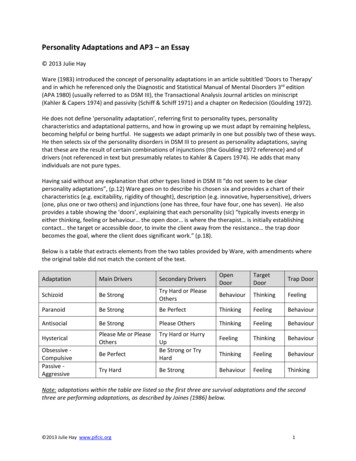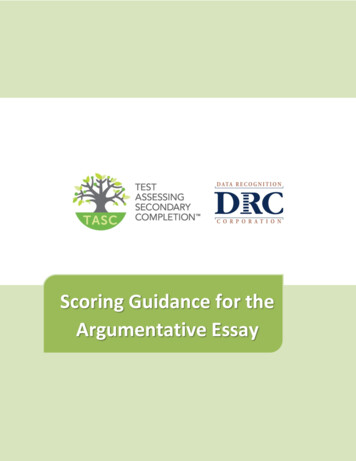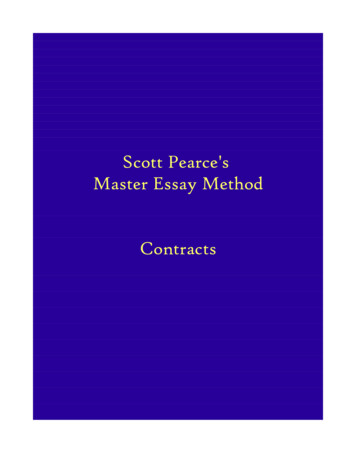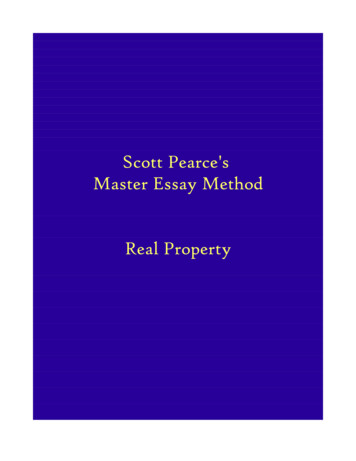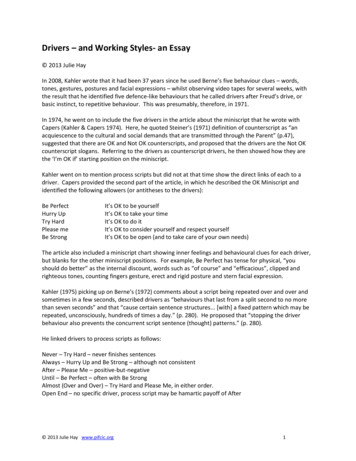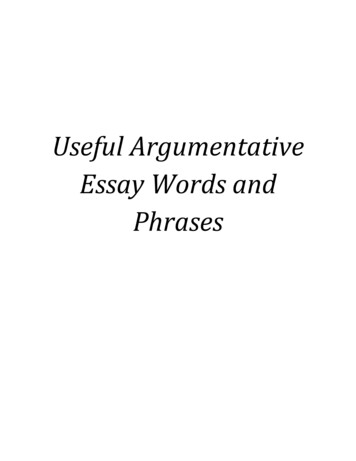
Transcription
EssoyWritingforEnglishTestsGobi Duigu
@ Gabi Duigu 2002All rightsreservedRevisedand reprinted2003Publishedby AcademicEnglishPress9/13 ArmstrongStreetCammerayNS\f 2062AustraliaP h : 0 2 9 4 3 76 3 3 0edu.auemail: g.duigu@unsw.Distributedby:Melting Pot Press10 Grafton StreetNS\W2008ChippendaleAustraliaPh: (61) 29212 1882Fax:02 9211 1868corn.auemail:books@elt.ISBN:0-9578996-1-0
lntroductionStogeITheQuestion. . . .3the QuestionL Understonding.31.1 The Instructions1.2 Kev Terms2. AnolysingtheQuestion.72 . 1F i n d i n g t h e F o c u s2.2 Understandingthe Context2.3DefiningtheTerms . '7' . . .8.10ldeosStoge2 Selectingond Presenting3, Findingldeos3 . 1B r a i n s t o r m i n g3.2 FindingMore Ideas3.3UsingExamples3.4The "'s7hatifNot"Situation3.5 Looking at the Other Side .4, Selectingldeos4 . 1S o l u t i o n s t o P r o b l e m s .2Evaluation . .4.3 Classificationof Ideas.r3.14. . . .15' '. '17'. '. 'I7. . .18.1e.19. . ' .20. . . . . ' '21
4 . 4 T y p e so f C l a s s i f i c a t i o n4.5 SelectingRelevantldeas4.6Levelof Generalisation4.7 OvergeneralisationsandExaggeration5, Orgonisingldeos.5.1 RankingIdeas5.2Consequences5.3Comparisons5.4 ternatives.5.5Speculation.". "23.25. ".26.28.3r. . .31.3I.33.34.34Stoge3 Writingond Style. .az6, Usingthe RightGrommor,Vocobulory6 . 1G r a m m a r6.2Vocabulary7, TheSectionsof the Essoy.37.39. . . . . .40.407.lThe Introduction7.1.1 Grammar andVocabularyin the Introduction . . . . . . . . .43.45.:7.2TheBody.47T.2.lYocabularyintheBody.487 . 3 T h eC o n c l u s i o n. . . . .49intheandVocabularyConclusionGrammar7.3.18, Style8 . 1M o d i f i e r ssVriting8 . 7I m m a t u r e ' W r i t i n g8 . 8C u l t u r a l D i f f e r e n c e s i n S w l e9. 53.53.58.55.57.5859AppendixA.64AppendixB.66
This course describesa step-by-stepapproach to writing essaysfor the IELISAcademic \Writing Module Task 2 and for other similar essaytasks. It providesexercisesto practisethe stagesindividually (Appendix A) as well as giving a listof rypical essaytopics, and there are model essaysgiven in Appendix B. TheAnswer Key provides explanationsas well as answers.ThePurposeIn order to be able to write good essaysit is first of all essentialto make sure thatyou understand the purpose of the task. It may seemobvious: the purpose is totest your abiliry to write essaysfor university or collegein English. However, amomenr's reflection will make it clear that the test task is quite unlike a universityessay,since it is typically 1 to 2 pageslong and is written on an unprepared topicin about 40 minutes. No university essayis like that. Even in universiryexaminations,where you may have to write about two pagesin half an hour, youare expectedto have studied the subject in advance.So let us consider some possiblepurposesfor the English test essay.These can besaid to be:a) to show that you are able to selectrelevant ideasand information toanswer a questionb) to show your knowledge and understanding of the topicc) to show your abiliry in presenting a logical argumentd) to show your skills in organising your ideassystematicallye) to show your abiliry to use sophisticatedEnglishf) to show your basic grasp of English grammar and vocabulary.
2EssoyWritingfor EnglishTestsThese questionscan be grouped into 4 categories,which reflect the 4 aspectsofan essay:'I.Understanding the question2. Knowing the subject3. Thinking skills4.Langaage skills(")(b)(a & d)(. & 0How should thesebe ranked in importance? Here is what the IELIS Handbooksaysfor the Academic \Writing Thsk 2:In Task 2 candidates are presented with a point of view or argument orproblem.Candidates are assessedon their ability to:. present the solution to a problem. present and justifr an opinion. compare and contrast evidence, opinions and implications. evaluate and challenge ideas, evidence or an argumentThe topics are of general interest and it makes no difference what subjectscandidates study. The issues raised are interesting, suitable for and easilyunderstood by candidates entering postgraduate or undergraduate studies.This shows that your knowledge of the topic is not the main emphasisin thistest. That is not surprising --*fter all, you are being examined for your writingabiliry in English, not for your knowledge.The main emphasisis in fact on yourabiliry to think and argue appropriately about a common issue.This is becauseuniversity students need to be able to to analyseand discussproblems andsolutions, and evaluateand expressopinions. University study is not simplyabout presenting facts.In order to argue appropriately there are two stagesinvolved: a) understandingthe question clearly,and b) being able to selectthe right method to present anopinion in a suitable way. This means organising your ideas and your language.This book therefore dealswith thesethree stages:I.II.III.Understanding the questionSelecting and Presenting Ideas AppropriatelyAppropriate Language Use
TheQuestionthe QuestionL UnderstondingThe first step in essaywriting is to analysethe essaytask which tells you what thetopic is, and also gives an indication of what kind of things you are expectedtosay about the topic.Essaytopics have 3 components:1) the instruction words, telling you what to do2) the key words indicating the topic3) the words restricting the topic, indicating what aspectof the topic youare asked to focus on.\Wewill consider these one by one.L l TheInstructionsLook at these tasks:a) Describe the role of the fnternet in modern society.b) Tbe enaironment is the m.ostimportant issttc in the utorld today. Discuss.What are the instruction words?
4EssoyWritingfor EnglishTestsIn a) it is describe and in b) it is discuss.These rwo words indicate the two mostcommon rypes of essaythat one can write.If you are asked to describe something, then your essaywill mosdy presentfactsand not opinions. However, if you are askedto discusssomething, then youropinion is being asked for, and you are usually expectedto eaaluatesomething, orto arguefor or against something. At universiry or collegeyou are expectedto beable to discussproblems and ideas,rather than simply to report on facts, and sothe IELTS essayquestion presentsa common situation or a present-dayissueaboutwhich people have different opinions, and asksyou to give your own views onthis topic.Here is the rypical wording of an IELIS essaytask:Present a written argument or caseto an educated reader with nospecialist knowledge of the following topic:'Wbliue in a technohgical age. Hotueuer, tecltnology cnnnot solue all theutorldi problems. Therefore sornepeople argue that ue need to phce lessemphasis on technological solutions and more on other aalues.To what extent do you agree or disagree with this opinion?You should use your own ideas, knowledge and experience to supportyour arguments with examples and relevant evidence.The first part of the instruction makes it clear thata) you need to present a seriousargument in a formai sryle (for an'educatedreader')b) you are not being tested on your deep knowledge or understanding ofthe subject ('with no specialistknowledge').The last part of the instruction offers a suggestionabout what to include. ('Youshould use your own ideas,knowledge and experienceto support your arguments'Wewill deai with this more in the next section.with examplesand relevantevidence.')Now let us look at the ouestion itself. This also has two components:a) the description of the topic, which is usually expressedas a point ofview on a curfent situation andb) a question asking you what your opinion is.
EssoyWritingfor EnglishTests 5Part a) is generally expressedin 1 to 3 sentences.One or two sentencesmay presenta statement or a question about a situation: ('\7e live in a technological age, buttechnology cannot solve all our problems').The secondpart will probably presenta conclusion that some people draw from this situation ('thereforewe should placelessemphasison technology and more on other values').This is designedto helpyou to think about the contents. (More about this in the next section')Part b) asks the question. This may be phrased as to utltat extent do you agree?orwhat is your opinion? or do you agreewith this?or words to that effect.Now what is your task?a) to present both sidesof the argument?b) to either strongly support or strongly oppose the argument,depending on your own personal opinion?c) to partly support or partly oppose the lrgument, depending on yourown personal opinion?The correct answer is either b) or c).The words to uthat extentmean the sameas ltout murh. That is, your answerwillexpressone of theseattitudes:a) I agreecompletelyb) I agreepartly and disagreepardyc) I disagreecompletely.Many students feel that they need to present a strong argument for or against anidea or proposition. This is not true. Even if the words to uthat extent do not appearin the quesrion, it is always acceptableto agreeor disagreepartly with a proposition.There is another point to remember here. Although it is usually easierto writewhat you actually believe, it is not absolutely necessary.If you do not have enoughideas or examplesto support the side of an argument that you want to suPPort,you can always say something like: on the one hand.,., but on the other handand presentarguments for both sides.However, you should not simply contradictyourself. That is, you should not say I agreein one section and then I disagreeinthe next paragraphs.That sounds as if you are simply confused or are not expressingwhat you think at all. Vhat you can say is: Theseare some argumentsfor andtltese are some argarnenE agairrt, and so I only partly agree / disagree,Or you cansay: Tbere are good arguments on both sides, but on tlte tahole I prefer the
6EssoyWritingfor EnglishTestsargumentsfor / against. (Of course you would not use these actual words. Theyonly summarisethe possibleunderlying meaningsin your essay.)Remember, you are not being examined on your opinions, but only on how wellyou can expressand support some intelligent ideas,whether they are your ownor not.1,2 KeytermsThis is usually the easiestpart of the essayto deal with. Normally the key wordsdeal with a familiar topic, such as the Internet, or television, or technology ingeneral.This is becausethe examiners are not testing you for your knowledge, butrather for your abiliry to write well. Therefore the topics chosenwill be aboutconcepts and issuesthat they expect every educatedperson to know somethingabout. Common topics include:Edtr.tioriThe environmentInformation TechnologyThe mediaAdvertising / consumer issuesSocial problemsHealthLifestyles (including life in cities, traffic problems, quality of life)Culture and society (music, art, literature, television etc.)Foreign languages and travelSportScientific research (including genetic engineering, sPacetravel)Ethical issues (right and wrong behaviour such as the treatment ofanimals, law enforcement etc.)Try to thinh of other topics that you hnow ltaue been used in preuious examinations, or that you thinh might occur.You can find sample questions on all of these topics in Appendix A.In order to be prepared with ideason such key concepts,it is necessaryto keepup to date with the major issuesbeing discussedin the world. The editorial pagesof newspapersand news magazinesare important sourcesof such information, asare current affairs radio and television programs.
TestsEssoyWritingfor English2, Anolysingthe QuestionUnderstanding the question means more than understanding the instructions orthe words of the question. It means recognising the focus of the question, andknowing what approach you should take to the topic.This is, in some ways, the most important aspect of writing the essay,and requiresthe most thought. You should therefore be prepared to spend at least 3 minutesthinking about what approach to take to the question.The handbook, you remember, explains thatCandidates are assessedon their ability to:. present the solution to a problem. present and justifr an opinion. compare and contrast evidence, opinions and implicationse evaluate and challenge ideas, evidence or an argument.You will therefore need to decide which of theseapproachesis the one requiredfor any particular question. You will also need to know when and how much touse definitions and examples.In this section we will deal with the following featuresof a discussionorargument essay:The FocusThe ContextDefinitionsExamples2,1Findingthe FocusIt is very important to look at the actual question words very closely.Studentssometimesjump to conclusionsabout what they should write by just looking atthe topic, and not at the focus of the topic. Consider the following questions:a) Many people belieae that the Internet is tlte most reaolutionarynew inaention of the last century. Do you agree?b) The Internet has reuolutionised the modcrn uorld, but manypeople argae that it has ako created neu problems and inequalities.rl{hat is your opinion?c) The Internet could reuolutionise the tporld in future, if eueryonecould haue easyAccessto all the inforrnation that is aaaikble onthe W'orld rYidz \Veb. Do you agree or disagree uitb this statetnent?7
TestsEssoyWritingfor EnglishIn each of the above the topic is the Internet and its revolutionary role in theworld. So you must have a basic idea about what the Internet involves and thinkabout what reuolutionisemeans, i.e. makefandamental changes.Howeveq each onealso raisesa different question and must be answereddifferently. It is necessaryto look at the remaining words carefully to seewhat is required:a) is the most revolutionary new invention of the last century.b) has revolutionised the modern world, but it has also creatednewproblems and inequalities.c) could revolutionise the world in future, if everyone could have easyaccessto all the information that is availableon the'World Vide'Web.You can seethat a) involves comparing the Internet with other inventions, andarguing that it is, or is not, the most revolutionary. On the other hand b) expectsyou ro accept that it is revolutionary, and to consider both its benefits and theproblems it has created.Finally c) wants you to speculateabout the future, and toconsider how much you believethe future benefits will change the world.the Context2,2 UnderstondingRemember that the IELIS Handbook says that the topics are of general interestand it mahes no difference tahat subjects candidates study,It goes on to say thatThe issuesraised are interesting, saitable for and easily understood by candidatesentering ltostgraduate or undergraduate studies.The question is always basedon an issue,or a problem.which you are askedtoanalyseand present an opinion on. If something is considereda probiem or anissue,it meansthar reasonablepeople must have conflicting opinions on the topic.You would not, for example, expect a question like this: Somelteoph consider thatmurder is urong, Tb rahat extent do you agree?since there is not much to be saidin favour of murder. In other words, it is not just some people who think thatmurder is wrong, but basicallyeverybody. It is not an issue.However, look at thisquestion: Somepeoph think that murderers should be executed. To uthat extent doyou agree?Here the question is about what to do about murder, and that is verycontroversial!There are very strong opinions about this on both sidesand youneed to be awareof theseto deal with such a topic. (In fact it is unlikely that IELISwill presentyou with very political or emotional issueslike this')You therefore need to think, before you plan your own answe! why the question'!?'hatare the differentis considered to be an issueor a problem by the examiners.
EssoyWritingfor EnglishTestsopinions that might exist on the topic? *Vhat is the context in which this topic iscontroversial?That is to say,who are fie peoplewho are concernedabout it and why?It is also necessaryto interpret the underlying meaning of a question. Sometimesthe wording can be quite different berweentwo questions, but the underlyingconcepts are the samebecauseof the context.IASK IIn the following questions the wording is different but the underlyingmeaning is sometimes the same. Test your ability to interpret topics byidentifring which of the following basically ask the same question. (In eachcasethe statement would be followed by a question asking for your opinion.)a) Tbrtiary education is of greater benefit to tlte indiaidual receiuing ittban to the societlt as a ultol.e. h is therefore not dzsirabl"efor goaert rnentsto spend the ttucPalers'money on supPorting studentsjust so that tbeycAn earn rnore mone! in future.b) Parents haue a greater influence on their childreni future successthanschoob do. Goaernmentssltould.thereforeprouide parent naining courses''teacltertraining courses'.ratlter than)Free tertiary education is essentialfor eaer! countr! since tertiarygraduates are tlte only quaffied and educated peoPle that can helpcountries to ?rogress in the modern utorld.d) Education is the most important source of children\ deuelopment,Nomatter uhat their bacbground, if children ltaue good schook andteaclters they can progress, Gouernments sltould thereforeput theirmajor resourcesinto scltool education.e) Modern scienceand technologjt can solae euironmental problems, sucltmough resourcesto researclt,aspollation and ghbal uarming, tf *t"Ppbf)People tltrougltout the uorld are ignoring the dangers of enuironmentalpollution and of global utarming in the ltope that scimce and technologycan f.nd solutions. Tbis is not true. W'eall need to tahe responsibility forthe damage u)e Are causing and rnust change our life-styles.a Answer Key
l0TestsEssoyWritingfor EnglishTASK2Choose 3 questions &om Appendix A and consider what dre context mightbe for them: what kind of people might be most concerned about the issue,and for what reasons could these topics be considered problematic?(Discuss in groups if you are in a class.)2,3Definingthe TermsSome books and teacherstell you that you must define the terms that you use sothat the readerwill understand you. This is sometimestrue, but it is necessarytobe sensibleabout it. For example,look again at two of the examplesgiven in2.1:a) Many peoph belieue that the Internet is the most reuolutionary neuinuention of the last century. To uhat extent do you agree?b) The Internet ltas reaolutionised the modern uorld, but it bas akocreated neta probhms and inequalities, Do you agree?\Vhich of the following terms do you think need defining?Internet; reuolutionary / reuolutionise; neut inaention; nlodern uorld;'World\Vide \Yeb.dangers; inequalities; eas! access;The "educatedreader" that the IELTS test asksyou to write for can be assumedto understand these: Interneti neut inuention; modern urorld; easy access;.WorldVide W'eb.However, the term reaolutionary or reaolutionise can be interpreted differently,and in fact you need to explain what you mean by it in question a) otherwise youcannot answer the question. However, that does not mean that you need to definethe terms directly. You will need to give an indirect definition of the degreeofchange implied, by showing how important you think the changesare that havebeen produced by the Internet, and whether these changesare more important anddramatic than other changes.
EssoyWriting for EnglishTestsFor question b) it is probably not necessaryto concern yourself with this term,becauseyou need to focus on the problems and inequalities, rather than on thedegreeof change. In this caseyou would be dealing with indirect definitions ofthesetwo concepts.(See4.2 on p.20, for a discussionon evaluation in definitions.)Now consideragain the first sample topic given in this book, and comPareit withthe sample given in the IELfS Handbook:\Y'eliae in a technological age. Houteuer, technology cAnnot solae all theworld\ problems. Therefore somepeoPle argue tltat we need to phce lessempharis on tecltnological solutions and more on other aalue*Now look at the sample topic given in the IELIS Handbook:Presenta written argument or caseto an educatedreader with nospecialistknowledge of the following topic:It is ineuitable that as tecltnologjt deuelops traditional cuhures must belost. Tbchnologyand tradition are incompatible - lou cnnnot haue bothtogetlter.You should use your own ideas,knowledge and experienceto suPPortyour arguments with examplesand relevant evidence.Do the rwo topics ask the same question or not? Both are about technology, andin both casestechnology is contrasted with something else.The focus in the firstquestion is on contrasting technology with other ualueswhile in the second question'Whetheryou treat these questions asit is contrastedwith taditional cubure.basicallythe sameor not depends on your definition of *adition end of otheraalues.Both are very broad terms) and can be interpreted in different ways, andhere it is important to take time to consider what they mean to the averageeducated reader,and what they mean to you. If you think of traditional cuhure asdealing only with material objects, such as food and clothing, then you will discussthis in one way. If you also include social activities such as music and dance andtheatre, then you may give a different answer.And if you include conceptssuchas religion and social behaviour, then you will be able to consider both questionsas basicallydealing with the same concepts,since other values in this casewouldbe included tn traditional cuhure.11
12TestsEssoyWritingfor EnglishIt is up to you to decide how broadly you want to consider the definition oftraditional culture, but you must make your concept clear to your reader.in thesameway, if you have the first question to deal with, you must indicate what youmean by otlter ualues.It is not necessaryto give a formal definition, which is very difficult to do. In otherwords, you do not need to write: Tiaditional culture can be dfined as.Instead you can wrire something like: By *aditional cuhure I mean not only thethings that peoph mahe, lihe hand-wouen clntlt or ltouses, but abo their ceremoniesand performances, such as mu.sicand dance.ln other words, you can give examplesto help you to define.'W'hatabout the terms technology and technological age?Do they need defining?Not really - again it would be enough to give examples'TASK3Look at the above two questions again and think about their foculIf youdecide to define traditional cuhure more or less in the same way as otherualues could you write basically the same essayfor both?Time: It is worfi spending enough dme on stage 1 to nsurethat your essayanswersthe question as it was intended by the examiners.If you spend 2 or 3minutes thinking about the topic, it may seemlike a iong time during anexam, but it is time well spent if it helps you to write confidently andappropriately.
ldeosSelectingond Presenting3, FindingldeosIn an essayof 250 words, to be written in 40 minutes, you cannot be too ambitiousabout what you write. Some students make the mistake of trying to expressverydeep ideasand they never get past writing an introducdon to what would be along essayif there was time. On the other hand, if you do not have any specificideasat all you may find yourself saying only one thing over and over again inseveraldifferent ways. This is not the way to get a good score.Look at thefollowing example:The Internet hasprouided great benef.tsto modern societybecauseit has helpedeuerlonein their work. It maheseuerythingeasier.It hashelpedall sectorsofsociety.Without tlte Internet,euerythingis rnuchmoredfficuh and tahesa longtime. But sincewe ltauetlte Interneteueryhind of uork is muclt easierto do.Thereforetlte Internet hasprouided great benefts to eaerlone.'bssay''saysalmost nothing. There is virtually no information and thereare no ideas.If someone whose English is not very accuratewrites like this, thereaderhas no ideas to think about and will only notice the grammatical andThis littlevocabulary mistakes.Generally what you need is to have a basic proposition statement (e.g. one thatanswersthe question to urhat extentby indicating a great deal, a linle, partly(seeabove) plus about three points or examples to support your argument.
VTestsEssoyWritingfor EnglishThree is a good number (although it can be lessor more), since that givesyou a5 paragraphessay,which is about the right pportingpointSupportingpointConclusionThe easiestway to find and organiseideasis to brainstorm.3,I BroinstormingIn order to organiseyour ideas for a topic, it is first of all necessaryto pin themdown. Most students find that the best way to deal with this is to brainstormtheir ideasfirst. This simply means jotting down any concePtsthat come intoyour head associatedwith the given topic, in note form, and in random order(i.e. in any order in which they occur to you).Let us look at a simple example.The question may be:Tlte Internet ltas reuolutionised tlte rnodern uorld, but it has ako creatednetuproblems and inequalities. Do you agree?\7e need to find ideas for both parts of the question - he revolutionising effectof the Internet, and also its problems. \We might come up with the following:o n l i n es h o p p i n enrailhackingfor reseetchinformaiion/ lheelrcbookingsconcertfot researchinformationcomnuniceiionbusinessfor policeetc./ andfor terroristssharinginfornration:/ lefi outhaveno accessP00rPeoPlePornograPhyviruses
EssoyWritingfor EnglishTestsTASK4'Writea brainstormed list of ideas relating to the topic:Children gend far too much time in front of teleuision and computerscreens. Their time should be strictly controlled.Discuss your ideas with someone else. You can also practise brainstormingwith other topics from the list provided in the appendix. The more youpractise, the easier it will be for you to think of ideas quickly during thetest.ut Answer Key3.2FindingMoreldeosIf you are having difficulties thinking up ideasat the right level of generalisation(seep.26 for a discussionabout this), then a good technique is to think of veryspecific, concrete examples,and then try to find a higher level of abstraction thatthe examplesbelong to. Let me explain this with a simple illustration. Imaginethat you are asked to write about this: The importance of animak to people is notalways recognised.Weshouldpa! rnore dttention to how we look afier and protectanimals. First you need to think about how important animals are to people.Begin by thinking of specific animals -- ny animals, inciuding lyNow organisethese under a higher level of LDANlttlAtSlionkangarooINSECTSrnosquitorflybutte15
16TestsEssoyWritingfor EnglishThink again, and come up with a sub-division of domestic lUnder insectswe have harmful ones -srosquitoes, and useful ones butterflies, which help to pollinate plants.Now we can go back to our topic, the importance of animals to people, and wecan say:1) some animals are important to us directly becausewe use their products(e.g.cows,sheep,goatsetc.)2) some animals give us pleasureas pets (dogs, cats, birds etc.)3) someanimalshelp us indirecdy e.g.by pollinating plants (bumerflies,bees etc.)4) some animals are just interestingand amracttourists (lions, kangaroosetc.)And i[ after thinking all that in our brainstorming and classifying,we suddenlythink of horses,we may add the categoryof animab that uorh for zs (and thenremember water buffaloes, donkeys, camelsetc.). In your essayyou will thenwrite about thesecategoriesof animals, rather than about individual species.This is a simple example, but the sameprinciple can be appiied to many topicsand it should help to provide ideasfor you to write about.TASK5Practise brainstorming concrete ideas and then classifring them underabsffact headings as in the above example with the following topics:a) People should not utorh too hard importance of leisure actiaities.th"y should remember theb) Education is the ntost irnPortant possessiona lterson can ltaae.,) Cirylife is toostessful.a Ansuter Key
TestsEssoyWritingfor English3,3UsingExomplesIn all essaysyou must give specific points to support your argument. Sometimesa topic will be quite abstract and it is important to realisethat you need to useexamples to support your point of view - and to make sure that you haveenough to say!The IELfS examination question itself specifiesthat You shoulduse your own ideas, knowledge and experience to suPPort your argumentswith examples and relevant evidence.Look at this topic:Young peoph are said to baue hst ntan! of the traditional aalues of theolder generation. This does not ntatter, becausethe old aalues haue norebuance in the modern utorld. Wb need to deuelop a urhoh neut set ofualues. Do you suPPort this statement?students make the mistake of trying to write only in generalstatementsabouta topic like rhis. That is difficult to do, becauseyou need very abstract,philosophicallanguage to do it well. It is much better to think of specific examplesof values andto use two or three of these to illustrate and support your point of view.M*y3,4The"Whot if Not" SituotionIt can happen that you are faced with a question tiat you have never thought aboutat all, and where it is difficult to think of concreteexamples.Remember,however,that the examiners select topics which have been considered controversial by manypeople and that there is always a social context for thesequestions.Imagine, forexample, that you get a question about whether you think the government shouldfund more research
test your abiliry to write essays for university or college in English. However, a momenr's reflection will make it clear that the test task is quite unlike a university essay, since it is typically 1 to 2 pages long and is written on an unprepared topic in about 40 minutes. No universit
